#science policy
Link
8 notes
·
View notes
Photo


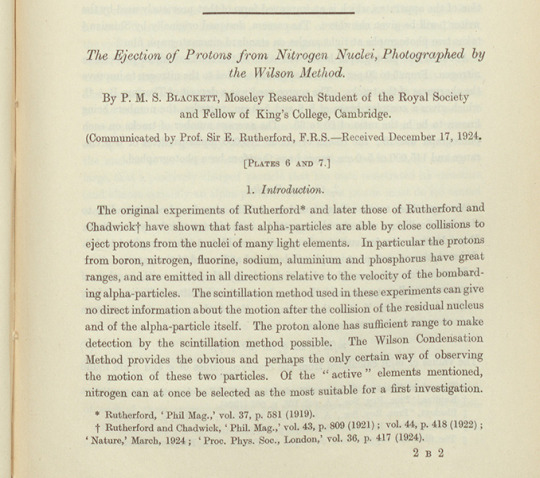
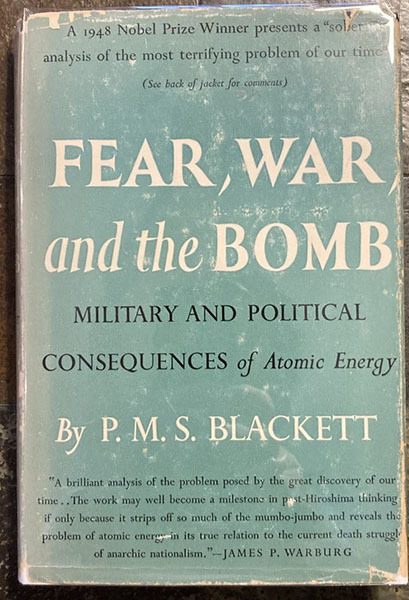



Patrick M.S. Blackett – Scientist of the Day
Patrick M.S. Blackett, an English particle physicist and science policy maker, was born Nov. 18, 1897.
read more...
#Patrick Blackett#particle physics#science policy#histsci#histSTM#20th century#history of science#Ashworth#Scientist of the Day
14 notes
·
View notes
Link
There is a lot to like about the OSTP’s new guidance, advocates say, but the framework is vague about things such as the enforcement of sanctions for people who break the rules, as well as the protocol for scientists seeking to talk to journalists or the public about their work. Those details will all be left to each agency’s discretion.
“I think that’s a missed opportunity,” says Lauren Kurtz, executive director of the Climate Science Legal Defense Fund, an advocacy group based in New York City. Although the policy seeks to strengthen scientific-integrity operations and create an independent panel that could provide consistency from administration to administration, Kurtz warns that these efforts aren’t guaranteed to withstand future political meddling. A hostile administration could wipe out the entire framework — as well as individual agencies’ policies — with the stroke of a pen.
A permanent solution would be to enact a federal law that would make it illegal for government officials now and in the future to violate scientific-integrity policies. Thus far, efforts to introduce such a bill in Congress have fallen short, but Carter remains hopeful.
“Eventually, all of this has to be codified in legislation,” he says.
...
More at the link.
9 notes
·
View notes
Text
Interesting Reviews for Week 35, 2022
Sleep as a window on the sensorimotor foundations of the developing hippocampus. Del Rio‐Bermudez, C., & Blumberg, M. S. (2022). Hippocampus, 32(2), 89–97.
Some implications of postnatal hippocampal development. Nadel, L. (2022). Hippocampus, 32(2), 98–107.
Spatial goal coding in the hippocampal formation. Nyberg, N., Duvelle, É., Barry, C., & Spiers, H. J. (2022). Neuron, 110(3), 394–422.
Thalamic subnetworks as units of function. Roy, D. S., Zhang, Y., Halassa, M. M., & Feng, G. (2022). Nature Neuroscience, 25(2), 140–153.
Bonus Publication:
The past, present and future of Registered Reports. Chambers, C. D., & Tzavella, L. (2022). Nature Human Behaviour, 6(1), 29–42.
#science#Neuroscience#computational neuroscience#Brain science#research#reviews#cognition#scientific publications#registered reports#science policy#Hippocampus
3 notes
·
View notes
Text
Accelerating Multilateralism with Transformations in Science Policy Practice Interfaces.
This side event outlines the crucial role that multi-lateral Science-Policy-Practice Partnerships play in building global capacities to implement the 2030 Agenda for Sustainable Development.
Side Event at the SDG Action Weekend organized by United Nations Sustainable Development Solutions Network (SDSN) , Permanent Mission of Ireland to the UN, Permanent Mission of Zealand to the UN, UNESCO and International Science Council (ISC).
To maximize the SDG Summit's impact, the Secretary General is convening an SDG Action Weekend, which will generate opportunities for stakeholders, United Nations entities, and Member States to convene inside the United Nations Headquarters and set out specific commitments and contributions to drive SDG transformation between now and 2030.
The SDG Action Weekend will consist of the SDG Mobilization Day on Saturday, 16 September, and the SDG Acceleration Day on Sunday, 17 September at UNHQ in New York.
The SDG Action Weekend includes a select number of high-level side-events identified through an open call that concluded in August. They are jointly organized by coalitions of Member States, UN agencies and other international organizations, and global stakeholder networks.
#multilateralism#science & technology#United Nations Sustainable Development Solutions Network (SDSN)#Permanent Mission of Ireland to the UN#Permanent Mission of Zealand to the UN#UNESCO#Side Event#International Science Council (ISC)#sdg9#sdg17#Science policy#sustainable development goals#agenda 2030
1 note
·
View note
Text
La conclusión de la forma cómo se debe sostener una alianza de los #EcosistemasCientíficos de financiados por #ColombiaCientífica hace 4años es la creación de Centros o Institutos de investigación para seguir investigando en cada una de las temáticas. Acá las charlas completas con los impresiones avances de los resultados de los proyectos y la financiación que han apalancado con el recurso inicial de $6mil millones(COP 2017): https://youtu.be/S9JBJ0h2rL8


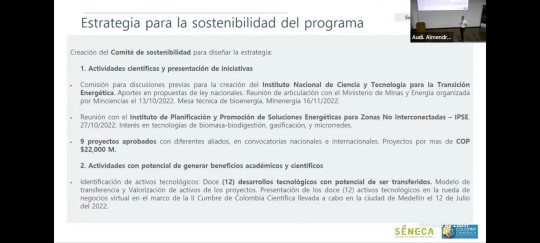
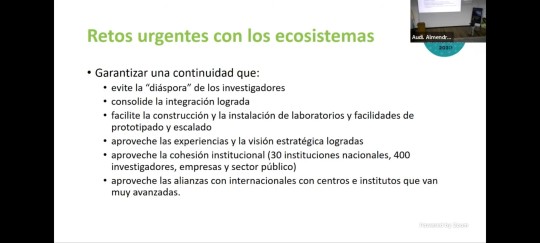
1 note
·
View note
Text
从Nature杂志关于俄罗斯的科学研究的报道所想到的
Nature杂志自克里米亚并入俄罗斯以来报道过多次俄罗斯的科学研究政策,口吻都是十分敌视的。
Putin’s Russia divides and enrages scientists | NatureRussia’s crackdowns are jeopardizing its science | NatureRussian secret service to vet research papers | NatureRussian science chases escape from mediocrity…
View On WordPress
0 notes
Text
There is not enough panic flowing through me to write my paper someone help
1 note
·
View note
Link
This space argued for development of small nuclear reactors for everyday energy requirements well before I knew what might be out there. The one thing I did know: if such a reactor were to be developed, it would not be approved. So naturally I read the article about NuScale’s small nuclear reactor with interest. Sure enough, the power generator has been stalled with the folks over at the Nuclear Regulatory Commission not for weeks and months, but for years and decades.
The NRC will approve reactors only if they are based on previously approved designs. If you have a design that actually innovates, forget it. You will have to sell the product overseas. No matter how safe it is, no matter how efficient, no matter, no matter how well it meets our needs for distributed electrical energy, you will have to sell it elsewhere. Innovation is not welcome here, especially for technology we decided a long time ago we did not want to trust.
0 notes
Text
https://iopscience.iop.org/article/10.1088/2752-5295/acfd4e
Real-time attribution of the influence of climate change on extreme weather events: a storyline case study of Hurricane Ian rainfall
0 notes
Text






Carlos Reyes Mounting TK Strand: A Study
#I think this is important not just for science but for maths geography art theatre physical education history and theology#Shoulders that could change government policy am I right lads?#carlos reyes#TK Strand#Tarlos#I'm not procrastinating YOU ARE
277 notes
·
View notes
Text
an embrace is glaring at you dark purple tulip flying over fast glaciers and glades
a bollywood chocolate boy doraemon blue
onlyfans persona in skin lace
with peaked beauty only a mirage
musk lip fillers granite breast augmentation testosterone replacement therapy
happily happy typhoon air insecure
secure bodies fuse it's not that you find me revolting it's that i am
of few that are opaque ash today
in a hundred years a nothingness
a fascile nothingness beneath your nail
you understand me digest me when i refund your long umbrella
your sanguine lingerie youth
wasted on religious southern fascism
the tragic movie is good only in parts poets are treacherous unforgiving
unforgettably contradictorily free
it's almost sad that you're seeing me age
near lake ullswater we see me age
clasped in each other's arms i know you don't believe me a decayed poet
#poetry#dhrit#inkskinned#politics#environment#social#conflict#war#policy#economy#life#spilled ink#relationship#religion#science#art#culture#love#luck#beauty#writerscreed#poetryriot
65 notes
·
View notes
Text
My New Article at WIRED
Tweet
So, you may have heard about the whole zoom “AI” Terms of Service clause public relations debacle, going on this past week, in which Zoom decided that it wasn’t going to let users opt out of them feeding our faces and conversations into their LLMs. In 10.1, Zoom defines “Customer Content” as whatever data users provide or generate (“Customer Input”) and whatever else Zoom generates from our uses of Zoom. Then 10.4 says what they’ll use “Customer Content” for, including “…machine learning, artificial intelligence.”
And then on cue they dropped an “oh god oh fuck oh shit we fucked up” blog where they pinky promised not to do the thing they left actually-legally-binding ToS language saying they could do.
Like, Section 10.4 of the ToS now contains the line “Notwithstanding the above, Zoom will not use audio, video or chat Customer Content to train our artificial intelligence models without your consent,” but it again it still seems a) that the “customer” in question is the Enterprise not the User, and 2) that “consent” means “clicking yes and using Zoom.” So it’s Still Not Good.
Well anyway, I wrote about all of this for WIRED, including what zoom might need to do to gain back customer and user trust, and what other tech creators and corporations need to understand about where people are, right now.
And frankly the fact that I have a byline in WIRED is kind of blowing my mind, in and of itself, but anyway…
Also, today, Zoom backtracked Hard. And while i appreciate that, it really feels like decided to Zoom take their ball and go home rather than offer meaningful consent and user control options. That’s… not exactly better, and doesn’t tell me what if anything they’ve learned from the experience. If you want to see what I think they should’ve done, then, well… Check the article.
Until Next Time.
Tweet
Read the rest of My New Article at WIRED at A Future Worth Thinking About
#ai#artificial intelligence#ethics#generative pre-trained transformer#gpt#large language models#philosophy of technology#public policy#science technology and society#technological ethics#technology#zoom#privacy
123 notes
·
View notes
Text
I have a really sweet coworker who just immigrated here from another country about a year ago. She came into work all excited the other day, saying “I heard some news on the radio that I think is good for you!”
She proceeded to tell me about the Florida law (HB 1467) requiring a certified media specialist to review books before they can enter school libraries and classrooms.
“More jobs for future librarians like you!” she said.
Sad to think this is how a lot of people probably see this law, and that many won’t bother to investigate further into how vague and harmful it really is for students (not to mention the teachers who could face a third-degree felony for violating the law).
I don’t know if this is an area of librarianship I really want to go into, but literacy has always been at the forefront of my academic/professional interests. That includes cultural literacy, which tends to fall under HB 1467′s broad language (re: theories that could lead to "student indoctrination”).
I’ve found myself thinking about the ways I could shape my librarian studies/career into something that involves combatting these and similar laws affecting our education system, but I’m still not 100% sure what that would look like--hoping to take Intro to Info Policy in the fall for some insight.
In the meantime, if anyone has any knowledge or experience regarding this topic, I would love to discuss it! I have a few friends in the K-12 teaching space but none on the librarian side, and they are dealing with enough already, unfortunately.
#hb 1467#censorship#librarianship#media specialists#librarian studies#mlis#msi#librarians#school libraries#florida libraries#libraryblr#gradblr#library science#information policy#thespookylibrarian#me
303 notes
·
View notes
Text
If we lived in a decent society we’d behead people like this

Absolute ghouls. People who see the looming water shortage as a profitable opportunity aren’t worth the air they breathe.
#at what point to wh break out the guillotine#i’m so serious#capitalism#late stage capitalism#anti capitalist#capitalist system#hunt the rich for sport#hunt capitalists for sport#eat the rich#water scarcity#water shortage#climate change#climate crisis#climate and environment#climate disaster#climate action#jail climate criminals#climate solutions#climate policy#climate science#climate news#climate catastrophe#climate activism#climate emergency#climate chaos
169 notes
·
View notes
Note
I can get why it was created, but why does Department of Homeland Security still exist?
A combination of bureaucratic inertia and lack of political will. For the former, a lot of civil servants’ careers and influence depends on the existence of DHS as a Cabinet department. Even if the major functions of DHS would continue just as they have always done (the dirty secret of DHS is that the coordination and information-sharing that was the rationale for creating the department in the wake of 9/11 never actually happened and that most DHS agencies do their own thing like they did before the reorganization), a lot of high-up and middle managers would be at risk of losing their jobs or their power measured in terms of budget and manpower - so those folks are going to fight any attempt to de-establish the department with everything in their power.
Likewise, over on the political side, there’s a strong incentive to do nothing. Not only would a vote to reorganize DHS be controversial just in terms of generating lots of winners and losers, but it’s also a vote that could be easily characterized as “soft on national security,” and a lot of politicians would have to answer difficult questions about why they had voted to reauthorize or approve DHS funding in the past. Politicians don’t like having to admit to mistakes, and it’s easy to characterize a change of mind as “flip-flopping.” Finally, politicians also stand to lose power in this scenario - no DHS means no Homeland Security committee positions, means no DHS contracts and lobbyists to raise money off of. And so it goes.
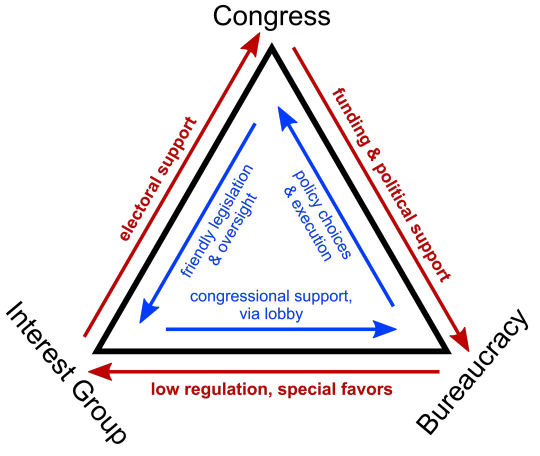
24 notes
·
View notes